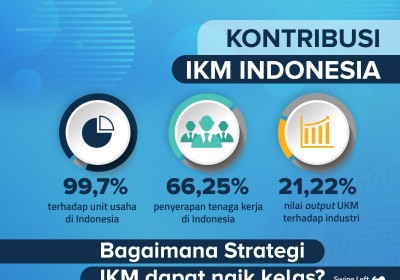Despite Export Potential, UKMs Remain Segmented
July 13, 2021
JAKARTA – Small and Medium Businesses (UKM) make up 99.7% of all business units in Indonesia and fulfills 66.25% of the entire national workforce. However, the output of UKMs towards the industry is only 21.22%. This is a challenge for all parties involved, as it also highlights the fact that UKM markets tend to be very segmented and have yet to be able to mass produce.
The government is still pushing on with efforts to assist small industries through government decree No. 29/2018 on industry competitiveness and export potential.
"Small and medium industries have a lot of business units and workers. So the challenge is to alleviate the poverty rate by providing more job opportunities. The government continues to maintain its partnerships with industries for the sake of strengthening the national industry," the Industry Ministry's (Kemenperin) director general for small-to-medium scale industries and miscellaneous (IKMA) Gati Wibawaningsih said during the Inspiring Session Road to Indonesia Development Forum 2021 on Tuesday (29/6).
Currently, the government is executing 5 key programs for small-to-medium industries to improve financial access, resource access, technological facilities and production infrastructure, product quality, worker expertise and market access. Through the Kemenperin, the government is edging towards a 4.0 program with the target of fulfilling the 2030 Indonesia Maju goal.
"The problem with UKMs is that they are reluctant to go into the export market because they lack the knowledge of the market itself, especially how to penetrate it, and the documentation aspects that are needed. They are also burdened by the lack of financial access, are rather inefficient in distributing their items on a large scale and do not have the productivity standards needed for the export market," Gati added.
Director of CV Cocoon Asia Djudjuk Aryati also sees Indonesian UKM's potential to enter the export market due to the abundance of resources at their disposal, especially for the furniture industry, who are surrounded by the third largest forest in the world and are the world's largest supplier or rattan. Indonesia also has the second greatest number of human resources in the world after China, as well as many experts and skilled workers, resilient business actors, scattered UKMs and an inclusive investment climate.
According to Djudjuk, the issues of raw material access to marketing are already being handled by the government, and the larger issue at hand is improving the quality of workers that graduate from vocational schools (SMK). "There is a lack of technological use and adoption in SMKs. Many SMKs still operate ancient technology, and this results in the graduates being unable to use newer technology once they graduate," Djudjuk said.
He added that the priority strategies to boost exports are increasing the frequency of training, standardizing production to meet export requirements, providing facilities for the provision of modern equipment, market information, mentoring and certification facilities, promotion of national and international export exhibitions and capital facilities.
Government programs have helped CV Samara Micron Saleronell vice president director ST Irvan to develop his UKM to a greater scale.
"Incidentally, because we were part of the Indonesia Food Innovation program, there was a lot of information that we got from it. After the event, we finally got the insight needed and decided to develop a proper business strategy, such as focusing on the domestic market first and further product development," he explained.
PT FIN Komodo Teknologi CEO Ibnu Susilo added that the requirements for a small business to "graduate" is that they are able to create their own principles for products based on technology. "Also, building proper R&D databases independently, building up supply chains, focusing on the domestic market first, developing aftersales, etc.," Ibnu said.
As one of the largest e-commerce platforms in Indonesia, Shopee has also participated in providing guidance to 40 cities in Indonesia through the development of seller communities. According to Shopee's head of public policy and government relations Radityo Triatmojo claims to have fostered 60,000 SMEs and succeeded in increasing SME transactions by 61%.
"We created an ecosystem for UKMs at Shopee through the Shopee campus. The training is free and online, as they learn how to use online platforms for selling, saving operational costs in the process because the lessons itself are online. Through this program, sellers are able to also develop business relationships with each other, and join communities in the process," Radityo said.
He added that the company is also actively guiding local SMEs for export by connecting them to six countries, where Shopee also operates: Thailand, Vietnam, Singapore, the Philippines, Malaysia and Brazil.
Indonesia’s Research Institutions Supporting the Development of the Electric Vehicle Industry
Indonesian Muslim Fashion and Cosmetics IKMs Shine at Dubai World Expo 2020
Govt Steps Up UMKM Transformation Efforts in the Midst of Pandemic Slowdown
Govt Encourages Promotion of IKM Products in Digital Era
Government Begins Developing Maritime Training Center in Makassar
Tweets by IDDevForum
